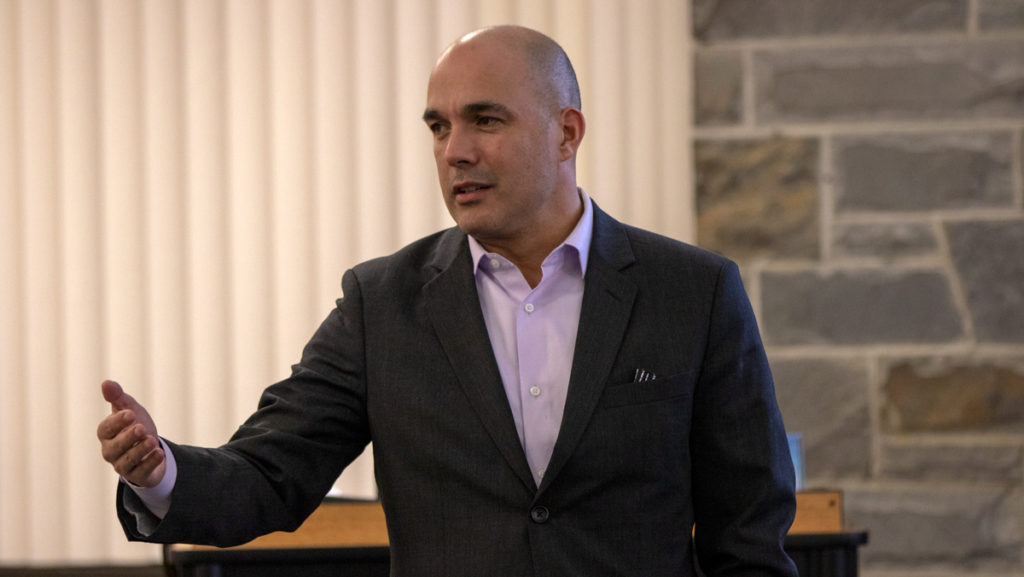Bill Guerrero, vice president for finance and administration at Ithaca College, spoke to the Student Governance Council (SGC) about ending the college’s contract with Sodexo, the college’s food provider, and his plans to transition to a self-operating dining service at its April 8 meeting.
Sodexo is a food and facilities management company that has been the college’s food provider for nearly 20 years. On March 18, the college announced that its contract with Sodexo will end June 3. This came after years of criticism from students on campus for its food quality and business practices.
Guerrero said that the process of switching from Sodexo to a self-operating dining service system will be difficult but added that the college will now be able to explore the options of changing the hours of operation of the dining halls, bring in new and local vendors and decrease the cost of meal plans.
He said he thinks having quality dining services is beneficial to both prospective and current students.
“I believe dining is a significant piece for recruitment and the retention of students, as well as instrumental for your overall academic success,” Guerrero said. “I don’t want students or their parents emailing me about food when you should be worrying about how well you’re doing in school and other experiences.”
Guerrero said he attempted to work with Sodexo to address issues such as the moldy hamburger bun served in Terraces Dining Hall in Fall 2018 but found none of the problems could be resolved, so he made the decision to cancel the contract with Sodexo.
He said one of his main focuses is the employees who work in Dining Services. He said he met with all of the Dining Services employees and discussed his plans to cancel the contract with Sodexo with them before he made any changes.
Guerrero also said he hopes to no longer rely on vendors that serve frozen foods and instead use vendors that serve fresh food.
Guerrero said it is possible to make changes to the vendors in IC Square as well. He said the nature of having a self-operating dining service allows for different vendors to be brought in to IC Square.
“If you do it right, you can have one thing one year and another the next,” Guerrero said. “You can have sushi, halal, Korean — you can have all these cool things.”
He said he is having conversations with Gimme! Coffee to possibly expand on their partnership. He said he is also having conversations with local businesses such as Purity Ice Cream, Moosewood and Ithaca Bakery to collaborate with them in different ways.
He said he met with people from Cornell University, and they are interested in helping the college successfully maintain a self-operating dining service.
“Cornell is not just that school on East Hill, they want to help,” Guerrero said. “They want to help us, and that can be from menu sharing, it could be from processes, it could be from staff training from the hospitality school.”
He said he also wants to extend Late Night dining to the Campus Center Dining Hall.
“Late Night is great, but it’s only at Terraces, and does that mean that’s the only place it can be?” Guerrero said.
He said the ultimate goal of these changes is to solve food insecurity, an issue that can be addressed through mandatory a la carte — unlimited meal plans — and the food pantry on campus. He said these meal plans will be less expensive than the current meal plans but did not give any explanation as to how this will happen.
In addition to Guerrero’s presentation, SGC also tabled a bill to increase the amount of Automated External Defibrillators (AEDs) in residence halls. The bill is sponsored by sophomore Transfer Students Senator Connor Shea and freshman Maxwell Powers, Residence Hall Association representative.
The recommendation suggests the college install AEDs in locations that are easily accessible and available within three minutes of any area within a residence hall. It stated that the AEDs will be linked to the Office of Public Safety, so it will be alerted when an AED is used. It also states the college will make sure the AEDs are maintained and kept up to code.
The bill was unanimously tabled because the Senate felt it was necessary to make edits to the bill because of false and inadequate information in the bill and the lack of an action plan. It will be presented to the Senate again at a later time.
Senior Jenna Mortenson, Vice President of Campus Affairs, said the reason for the lack of AEDs in the residence halls are because of how expensive AEDs are. A single AED can cost between $1,500 to $2,000.
Shea said he plans to talk to the Office of Public Safety about the feasibility of installing AEDs in residence halls.







